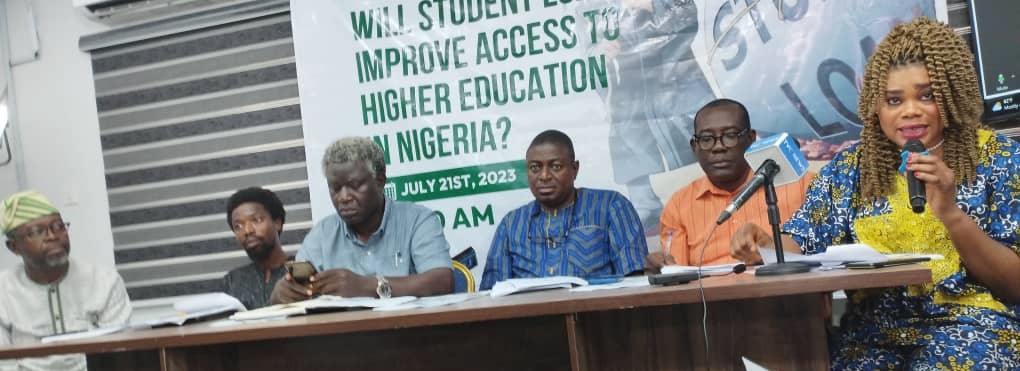CSOs, education stakeholders, parents fault, reject FG’s Students Loan Act
...Flay NANS, NLC, public for inaction over school fees, fuel price hike, others

By Edu Abade
Lecturer, Lagos State University (LASU), Dr. Tunde Akanni (left); Spokesman, Education Rights Campaign (ERC), Gideon Adeyemi; Prof. Adelaja Odukoya of Academic Staff Union of Universities (ASUU); Executive Director, Corporate Accountability and Public Participation Africa (CAPPA), Akinbode Oluwafemi; Deputy Chairman, Joint Action Front (JAF), Achike Chude and Project Officer, CAPPA, Zikora Ibeh at the symposium on Students Loan Act in Lagos.
Civil society groups, parents and some stakeholders in the Nigerian education sector, at the weekend, reviewed, faulted and vehemently rejected Federal Government’s Students Loans (Access to Higher Education) Act 2023, describing it as an attempt to stifle access to quality education in public schools at all levels across the country.
The groups, which also berated the President Bola Ahmed Tinubu administration for the arbitrary increases in fees in federal government colleges and tertiary institutions, maintained that the move was aimed at commercialising education with a view to finally selling off the public institutions to private individuals through public private partnerships (PPPs).
Lamenting the posture of the National Association of Nigerian Students (NANS), the Nigeria Labour Congress (NLC) and other hitherto vibrant pressure groups in the country for remaining silent and inactive in the face of subsidy removal, astronomical increases in pump price of fuel and electricity tariff, as well as the wrong-headed increment of fees in federal schools, they wondered whether organised labour and NANS were still functional.
The groups stated this at a symposium organised by the Corporate Accountability and Public Participation Africa (CAPPA) in Lagos with its partners from the Academic Staff Union of Universities (ASUU), National Parents Teachers Association of Nigeria (NAPTAN), Education Writers Association of Nigeria (EWAN), National Association of Nigerian Students (NANS), Education Rights Campaign (ERC), Takeitback, the Lagos State Scholarship Board (LSSB) and the Joint Action Front (JAF), among others.
In his address titled: Will Students Loans Improve Access To Higher Education In Nigeria?, Executive Director of CAPPA, Akinbode Oluwafemi, expressed concern that while the Federal Government was working on modalities to begin implementing the students loan towards the end of the year, maintaining that the policy risks further marginalising vulnerable groups, especially those of lower socio-economic backgrounds, thus reinforcing existing social inequalities in the nation’s education system.
“Moreover, issues of dilapidated educational infrastructure, poor budgetary allocation to education and insufficient remuneration for teachers and lecturers remain fundamental challenges facing higher education in Nigeria that the students’ loan scheme cannot resolve. These conditions highlight the futility of the loan in the face of deeper systemic problems.
“We fear that the students’ loan scheme might result in escalated tuition costs, which is already a growing concern, thus further undermining access to affordable and quality education in the country,” he stated.
Policy and Research Officer of CAPPA, Zikora Ibeh, who presented an overview of the Act, raised key concerns, which she said, makes the scheme unrealistic, impracticable and as such should be rejected in its entirety.
Such concerns arise from Section 14(b) that pegged the income cap of N500,000 per year, which amounts to N42,000 per month is a potential barrier; The loan scheme (Section 13) is established to cater for tuition only leaving other exigencies; Guarantor requirements in Section 14(c) reinforce social inequalities; and Conditions for disqualifying potential applicants in Section 15(a) raise issues of social justice.
Other concerns are, uncertainty in loan disbursement in section 16(4); Sexist undertone in drafting of the legislation as provided in Section 15; Repayment of loan may pose difficulties given prevalent economic realities as provided in Section 18(1-6) and governance concern under Section 5, which establishes the Nigerian Education Loan Fund to be domiciled with, managed and administered by the Central Bank of Nigeria (CBN) through commercial banks in Nigeria.
Other speakers at the symposium moderated by CAPPA Director of Progammes, Philip Jakpor, including Zonal Coordinator of ASUU, Prof. Adelaja Odukoya from the University of Lagos (UNILAG); Dr. Tunde Akanni of the Lagos State University (LASU); Deputy Chairman of JAF, Achike Chude; Spokesman of ERC, Gideon Adeyemi; Chairman of EWAN, Mojeed Alabi and National Director of Takeitback, Juwon Sanyaolu, faulted the Students’ Loan Act.
Insisting that promoters of the Act never sought public input before arriving at the N500,000 benchmark and hurriedly packaging it for the President’s assent, they further described the legislation as an “attempt to commercialise, exclude and alienate most Nigerians from accessing higher education.”
An attempt by Babatunde Tijani, who represented Executive Secretary of the Lagos State Scholarship Board, Abdur-Rahman Lekki, to rationalise the students’ loan scheme and sought understanding from members of the public to give the government a chance to try the scheme was rejected by participants at the symposium.
They, therefore, recommended that the Federal Government should use the funds drawn from various sources to increase budgetary allocation to education and ensure greater accountability and effective utilization of the Tertiary Education Trust Fund (TETFUND) and other interventionist programmes in the sector.
Government should embark on an intensive revitalisation programme aimed at improving teaching infrastructure in public higher learning institutions, which will involve enhancing classrooms, laboratories, libraries and Information, Communication Technology (ICT) facilities to ensure delivery of quality education.
The Federal Government, sub-national governments and the private sector should collaborate on a jobs creation drive to ensure that graduates of tertiary institutions secure gainful employment.
Government through the Federal Ministry of Education should organise an annual multi-stakeholder summit to provide a platform for continuous dialogue with stakeholders regarding government’s vision for the country’s education sector. It will also function as a feedback mechanism that would enable the government to measure the effectiveness of its policies and identify areas that require improvement, among other recommendations.
Participants concluded by stressing that the students’ loan law is an illegality meant to foist World Bank and International Monetary Fund (IMF) programmes on the nation’s education sector.
“It is a scam. There is nothing to it. Government wants to crumble the Nigerian education sector. The Students’ Loan Act is a war on education. Its details, conditions and requirements are unrealistic, not workable and as such it should be discarded and rejected in its entirety,” they stressed.











